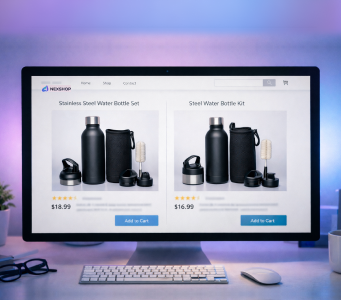Accelerated Intelligence: Moving at the Speed of Business
Accelerated Intelligence: Moving at the Speed of Business
Speed-to-market has been an age-old tenant of successful businesses; the companies that can reach customers with the right product or service the fastest often grab the biggest market share and establish their foothold with their target audience. Today, artificial intelligence (AI) has the potential to help – or hurt – that effort.

Amplification Effect
When AI is harnessed properly, retailers can accelerate their speed to transformation, speed to market, and speed to delivering exactly what their audience-of-one wants in real-time. Such a solution has the potential to amplify nearly limitless opportunities for today’s businesses.
At the same time, Gartner warns, AI-based solutions have the potential to magnify errors as well, “The more AI replaces human decisions at scale, the more it amplifies the positive and negative impacts of such decisions. Left unchecked, AI-based approaches can perpetuate bias leading to issues, loss of productivity, and revenue.”
The disruptions caused by the COVID-19 pandemic during the last two years have rendered the majority of historical retail data, which was all based on the ‘old normal,’ essentially obsolete. This, in turn, requires that former production AI and machine learning models be completely retooled.

While the global pandemic has prompted a great deal of innovation in a short period, it’s now time to step back and once again evaluate whether technology is meeting the right business goals.
The Need for Simplification
It’s easy for all of us to become enamored with the latest “bells and whistles” on rapidly developing technologies today. However, it’s critical to get back to the basics and make sure that the advances in technology are truly needed to significantly affect business value.
According to McKinsey, few CEOs “recognize their role in setting a strategic vision for the organization to build, deploy, and manage AI applications with such speed and efficiency. The first step toward taking this active role is understanding the value at stake and what’s possible with the right technologies and practices.”
AI doesn’t need to be arduous and difficult; the right solutions can be accelerated if businesses have clearly defined goals and objectives.
For example, today’s consumer is accustomed to voice-activated interfaces like Alexa and Siri. Simply ask a question in natural language to get an answer. The AI and ML behind providing those answers become more sophisticated each day. Applying that technology in a similar manner in the retail world has the potential to completely transform brands.

Hypersonix simplifies knowledge acquisition through smart data by facilitating the store manager or associates’ ability to make informed real-time decisions. A simple question like “What should the price of broccoli be today?” initiates an immediate and rapid consolidation of data including the store location, day of the week, shelf-life of the product, past pricing and promotions, consumer behavior, competitive offers, and more to deliver a suggested price. The performance of that pricing decision is then fed back into Hypersonix for more refined and accurate future decisions.
Before the Customer Knows
Besides accelerating the speed for retailers to implement and apply AI technology on a day-to-day basis, businesses must find ways to reach the customer more quickly. Today, that often means knowing what customers want or need even before they do.
Solutions often combine the power of AI-based predictive analytics and intent data to move in that direction. Aberdeen experts explain that “they are both used to uncover buyer purchase intent and to analyze the right signals when it comes to buyer needs, but how they do so is very different.”
While the first focuses on data-mining, statistics, and ML of historic information to guess what might happen in the future, the latter examples what’s going on right now. It’s often applied to customer search and click patterns and behavior on websites, but can really apply to any insight that allows retailers to better determine which customers are the best match for a particular product or even promotion.

Ultimately, this results in an intimate relationship between the retailer and every audience-of-one, allowing pricing, promotions, assortment, and channels to be customized and tailored to that specific customer’s anticipated wanted and needs. It’s about using AI to create an incredible and ever-improving customer experience faster than ever before.

.png)



